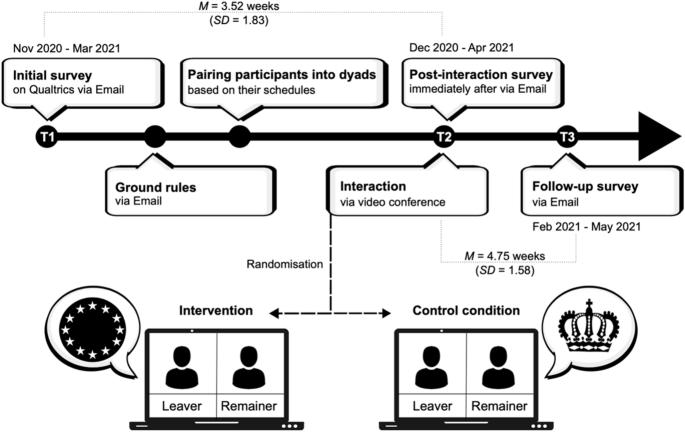A post-Brexit intergroup contact intervention reduces affective polarization between Leavers and Remainers short-term
引用次数: 0
Abstract
With mounting evidence of the harmful societal consequences of affective polarization, it is crucial to find ways of addressing it. Employing a randomized controlled trial, this study tested the effectiveness of an intervention based on theories of intergroup contact and interpersonal communication in reducing affective polarization in the context of Brexit. Participants were 120 UK self-identified Leavers and Remainers. Sixty Leaver-Remainer dyads were randomized to engage in either a facilitated intergroup interaction or a control interaction, which was equivalent in structure and tone but was unrelated to Brexit identities. Different aspects of affective polarization were assessed one month prior, immediately after, and one month after the intervention. Results indicate that the intervention increased warmth toward the outgroup, reduced unfavourable attributions of the sources of outgroup positions, and increased willingness to compromise, but only short-term. There were no statistically significant longer-term effects of the intervention. Evidence of selective attrition further suggests that those with more extreme baseline opinions were more likely to drop out. Our findings highlight the challenges of designing effective interventions that engender enduring attitude change in polarized contexts and of engaging those with extreme political views. This study can provide a useful framework for future research. Facilitated dyadic interactions between Leave and Remain voters following the Brexit referendum show short-term positive effects on some characteristics of outgroup perception.

英国脱欧后的群体间接触干预可在短期内减少脱欧者和留欧者之间的情感两极分化
越来越多的证据表明,情感极化会造成有害的社会后果,因此找到解决情感极化的方法至关重要。本研究采用随机对照试验的方法,测试了基于群体间接触和人际沟通理论的干预措施在英国脱欧背景下减少情感极化的效果。参与者为 120 名英国自我认同的脱欧者和留欧者。60 名脱欧者和留欧者组成的二人组被随机分配参与促进性群体间互动或控制性互动,后者在结构和语气上与脱欧者身份无关。分别在干预前一个月、干预后一个月和干预后一个月对情感极化的不同方面进行了评估。结果表明,干预增加了对外部群体的热情,减少了对外部群体立场来源的不利归因,增加了妥协的意愿,但这只是短期的。干预的长期效果在统计上并不显著。选择性减员的证据进一步表明,基线观点更极端的人更有可能退出。我们的研究结果凸显了在两极分化的背景下设计有效的干预措施以促成持久的态度改变,以及让那些持极端政治观点的人参与其中所面临的挑战。本研究可为今后的研究提供一个有用的框架。英国脱欧公投后,脱欧选民和留欧选民之间的促进性二元互动对外群体认知的某些特征产生了短期积极影响。
本文章由计算机程序翻译,如有差异,请以英文原文为准。
求助全文
约1分钟内获得全文
求助全文

 求助内容:
求助内容: 应助结果提醒方式:
应助结果提醒方式:


